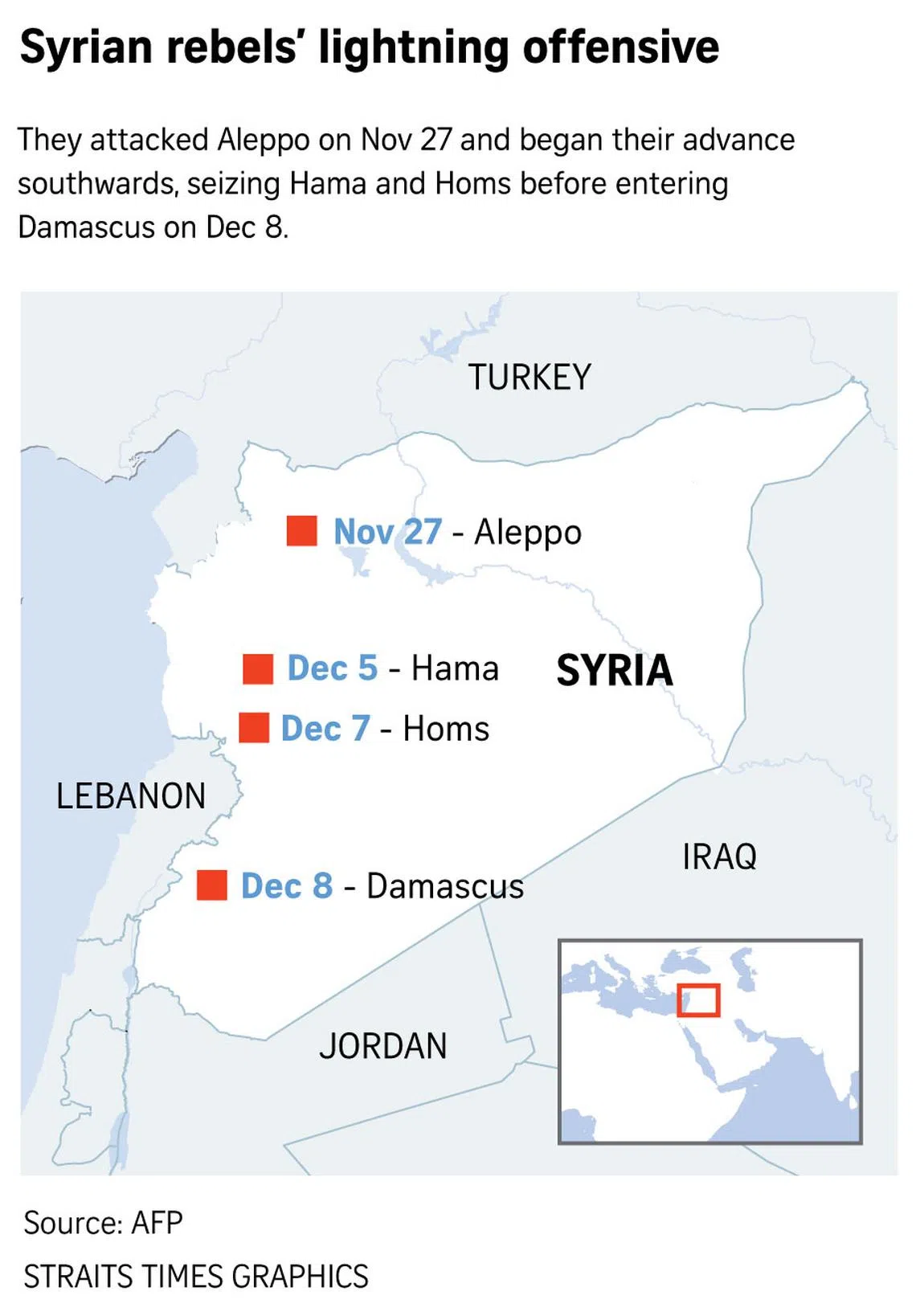Syrian rebels oust President Assad; Russia says he left the country
Sign up now: Get ST's newsletters delivered to your inbox
AMMAN/BEIRUT/CAIRO – Syrian rebels declared President Bashar al-Assad’s ouster after seizing control of Damascus on Dec 8, forcing him to flee and ending his family’s decades of rule after more than 13 years of civil war in a seismic moment for the Middle East.
The Islamist rebels also dealt a major blow to the influence of Russia and Iran in the region, key allies who propped up Mr Assad during critical moments in the conflict.
Israeli Prime Minister Benjamin Netanyahu said Mr Assad’s fall was a direct result of blows dealt by Israel to Iran and its ally Hezbollah.
The rebels said they had entered the capital, with no sign of army deployments. Thousands of people in cars and on foot congregated at a main square waving and chanting “Freedom” from a half-century of Assad family rule, witnesses said.
People were seen walking inside the Al-Rawda Presidential Palace, with some leaving with furniture from inside. The rebels said prisoners had been freed from a large jail on the outskirts of Damascus where the Syrian government detained thousands.
“We celebrate with the Syrian people the news of freeing our prisoners and releasing their chains,” the rebels said.
Leading rebel commander Abu Mohammad al-Jolani said there was no room for turning back and the group was determined to continue the path it started in 2011 during the Arab Spring uprisings.
“The future is ours,” he said in a statement read on Syria’s state TV after his forces took over Damascus.
French President Emmanuel Macron said “the barbaric state has fallen” and paid tribute to the Syrian people.
When the celebrations fade, Syria’s new leaders will face the daunting task of trying to deliver stability to a diverse country with competing factions that will need billions of dollars in aid and investments to rebuild.
One possible challenge could be a resurgence of ISIS militants. During its prime, the group imposed a reign of terror in large swathes of Syria and Iraq and directed external operations before it was defeated by a US-led coalition.
Underscoring the lightning changes, Iran’s embassy was stormed by Syrian rebels, Iran’s English-language Press TV reported.
Lebanon-based Hezbollah, which provided crucial support to Mr Assad for years, withdrew all of its forces from Syria on Dec 7 as rebel factions approached the capital Damascus, two Lebanese security sources told Reuters on Dec 8.
Mr Assad, who has not spoken in public since the sudden rebel advance a week ago, flew out of Damascus for an unknown destination
His whereabouts – and those of his wife Asma and their two children – remain unknown. The Russian Foreign Ministry said Mr Assad had left office and departed the country
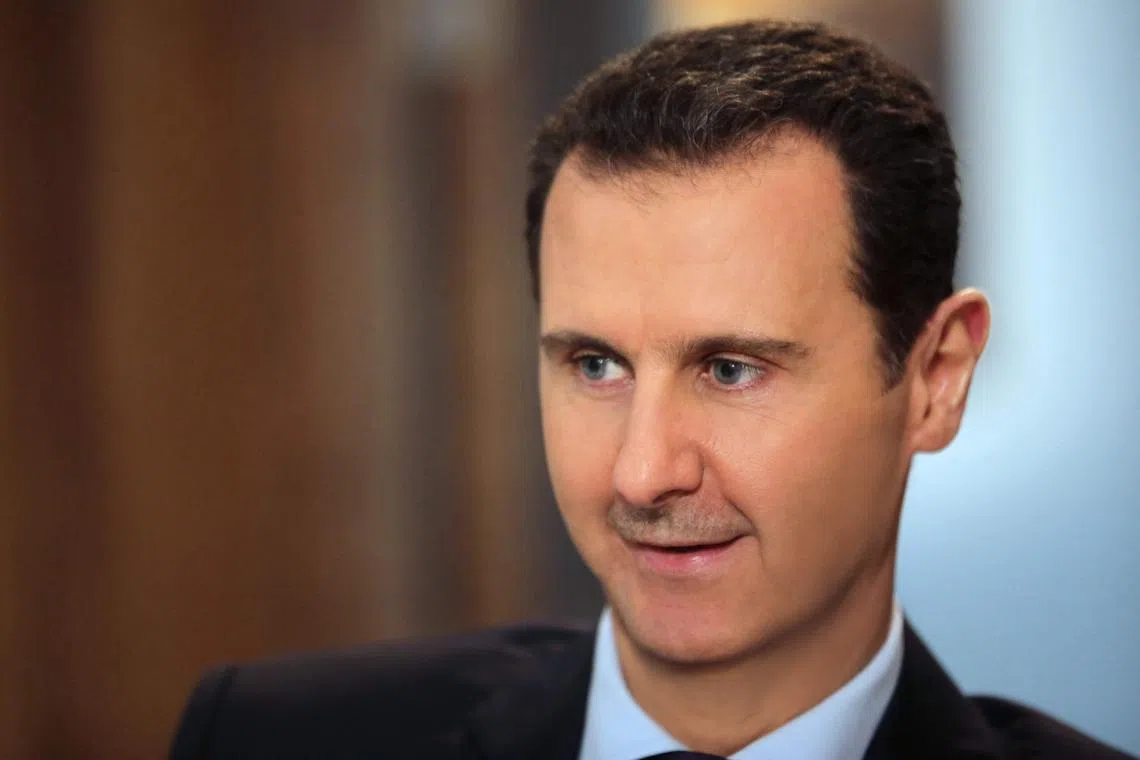
President Bashar al-Assad flew out of Damascus for an unknown destination on Dec 8.
PHOTO: AFP
The Syrian rebel coalition said on Dec 8 it is continuing work to complete the transfer of power in Syria to a transitional governing body with full executive powers.
“The great Syrian revolution has moved from the stage of struggle to overthrow the Assad regime to the struggle to build a Syria together that befits the sacrifices of its people,” it added in a statement.
As Syrians expressed joy, Prime Minister Mohammad Ghazi al-Jalali called for free elections. But that would require a smooth transition in a country with complex competing interests, from Islamists to groups with links to the US, Russia and Turkey.
Mr Jalali said he had been in contact with Mr Jolani to discuss managing the transitional period, marking a notable development in efforts to shape Syria’s political future.
The collapse of Mr Assad’s rule followed a shift in the balance of power in the Middle East after many leaders of Lebanon’s Iranian-backed Hezbollah group, a lynchpin of Mr Assad’s battlefield force, were killed by Israel over the past two months.
Russia, a staunch Assad ally, intervened decisively in 2015 to help Mr Assad during Syria’s civil war. But it has been tied down by the Ukraine war.
Russian Foreign Minister Sergei Lavrov held talks with Mr Geir Pedersen, the UN envoy for Syria, in Doha on Dec 7 when they discussed potential measures to stabilise the situation in Syria, the Interfax news agency reported on Dec 8.
Syrians will have to cope with a full-scale civil war alone, Mr Konstantin Kosachyov, deputy chairman of Russia’s upper house of Parliament, said, while suggesting that Moscow was ready to support the Syrian people in certain circumstances.
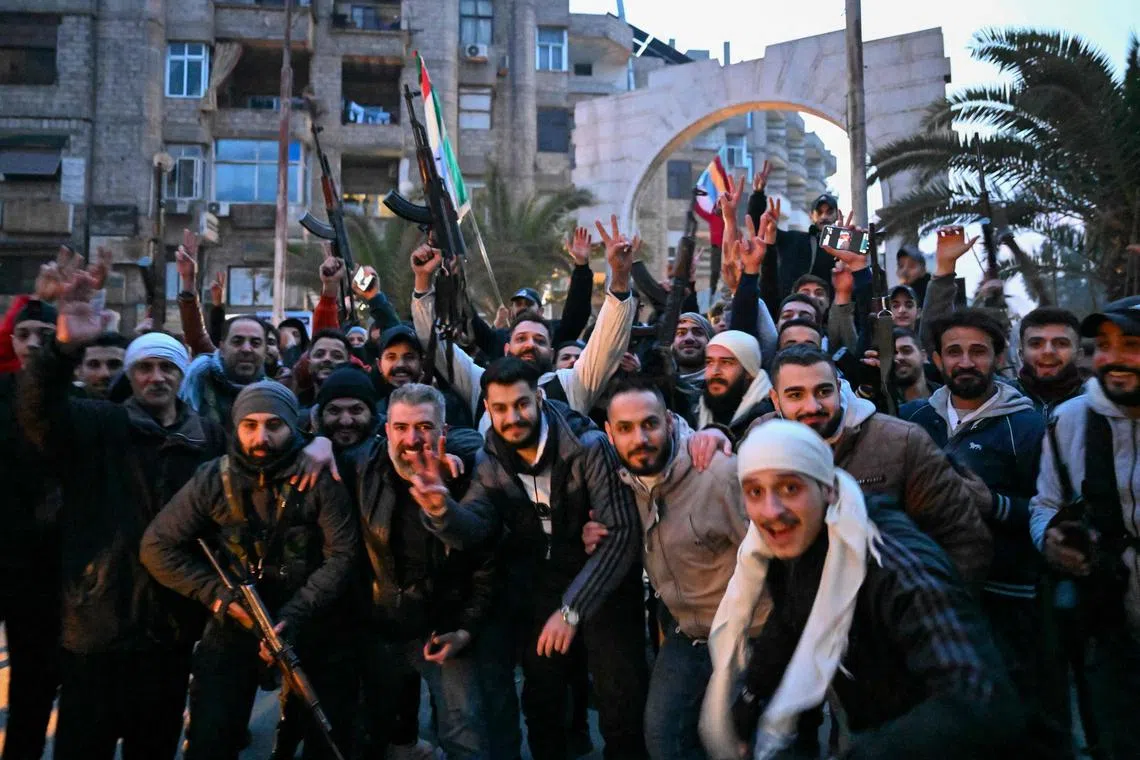
Local residents cheering as they gathered on a street in the Damascus suburb of Jaramana on Dec 8.
PHOTO: AFP
Syria’s civil war, which erupted in 2011 as an uprising against Mr Assad’s rule, dragged in big outside powers, created space for militants to plot attacks around the world and sent millions of refugees into neighbouring states.
The front lines of the complex civil war were dormant for years. Then Islamists once affiliated with Al-Qaeda suddenly burst into action, posing the biggest challenge to Mr Assad.
The pace of events has stunned Arab capitals and raised fears of a new wave of regional instability.
It marks a turning point for Syria, shattered by more than 13 years of war which has turned cities to rubble, killed hundreds of thousands of people and forced millions abroad as refugees.
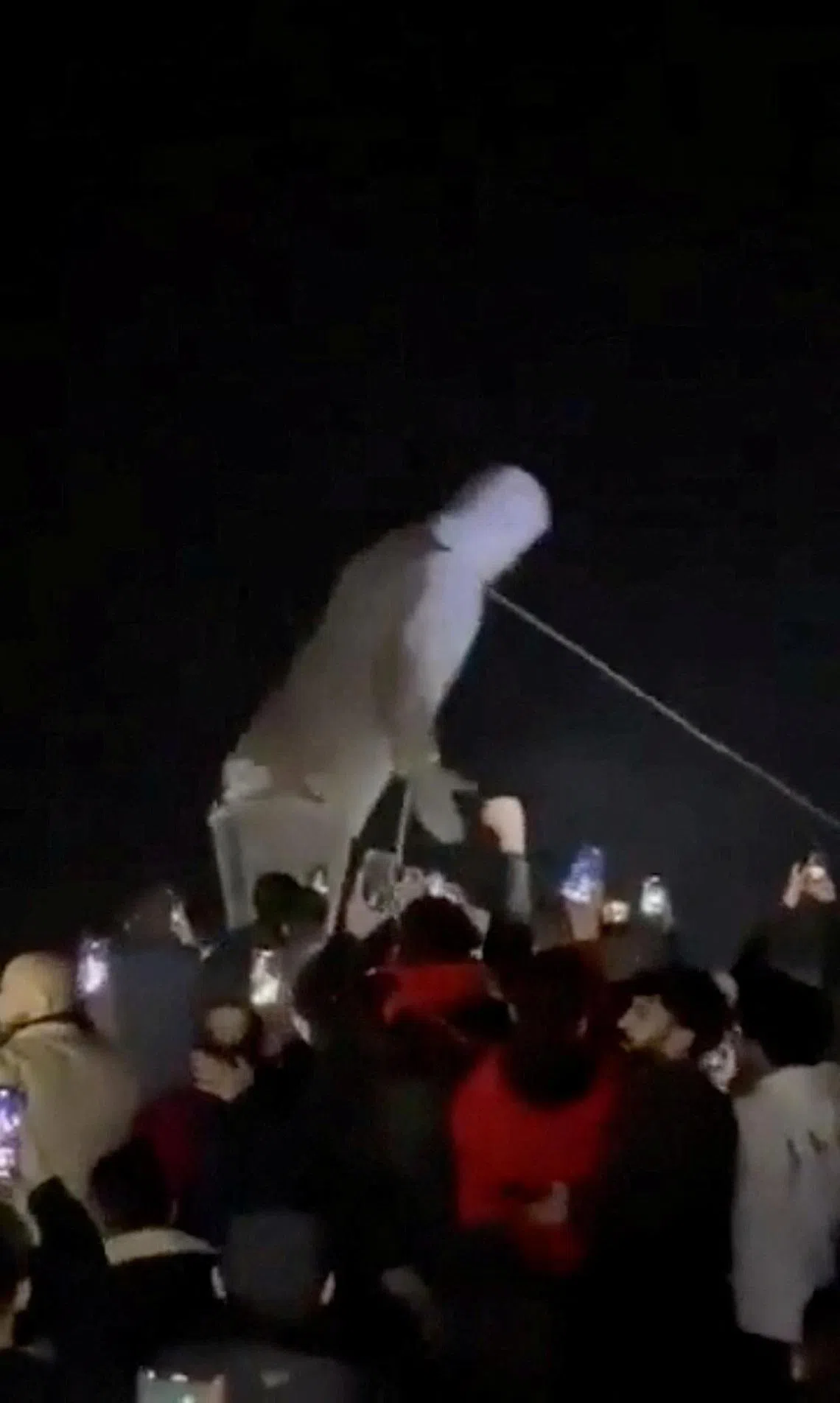
People cheering as the statue of the late Syrian president Hafez al-Assad was toppled in Homs on Dec 8.
PHOTO: REUTERS
Western governments, which have shunned the Assad-led state for years, must decide how to deal with a new administration in which a globally designated terrorist group – Mr Jolani’s Hayat Tahrir al-Sham (HTS) – looks set to have influence.
The US will continue to maintain its presence in eastern Syria and will take measures necessary to prevent a resurgence of ISIS, Deputy Assistant Secretary of Defence for the Middle East Daniel Shapiro told the Manama Dialogue security conference in Bahrain’s capital on Dec 8.
At a conference in Doha, Turkish Foreign Minister Hakan Fidan said “terrorist organisations” must not be allowed to take advantage of the situation in Syria and called on everyone to act with caution.
HTS, which spearheaded the rebel advances across western Syria, was formerly an Al-Qaeda affiliate known as the Nusra Front until Mr Jolani severed ties with the global Islamist movement in 2016.
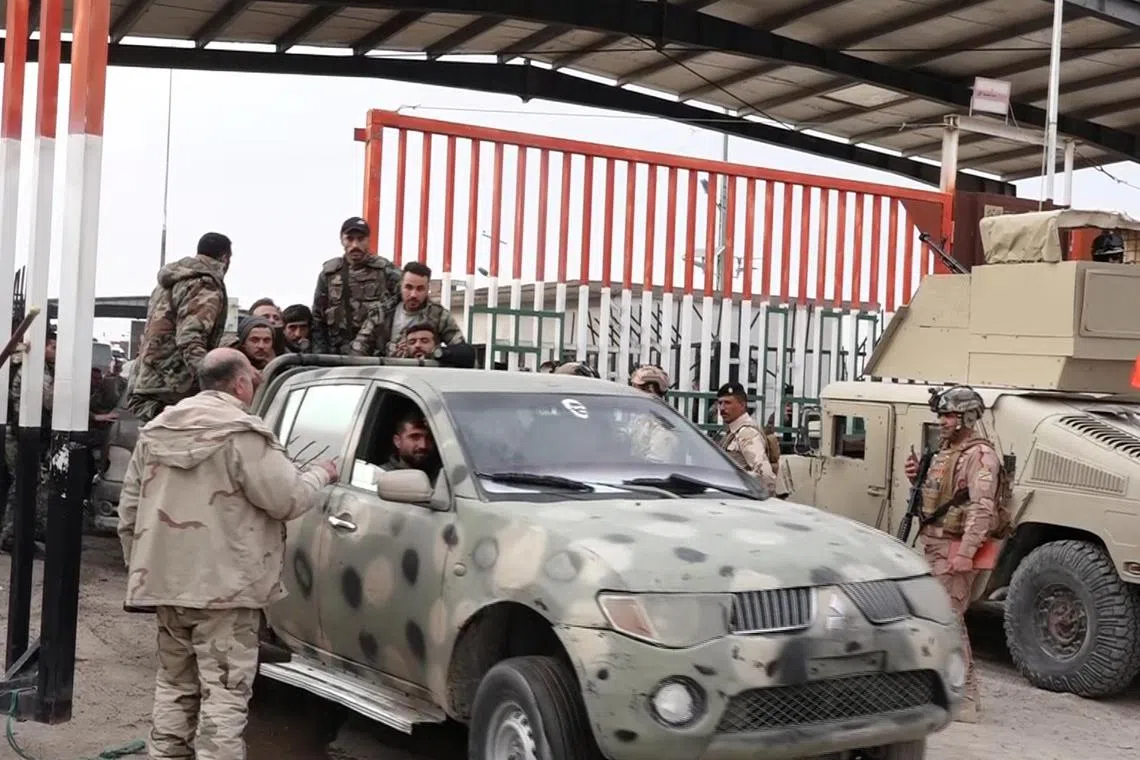
Syrian forces crossing the border through gates in Al-Qaim, Iraq, on Dec 7.
PHOTO: REUTERS
“The real question is how orderly will this transition be, and it seems quite clear that Jolani is very eager for it to be an orderly one,” said Dr Joshua Landis, a Syria expert and director of the Centre for Middle East Studies at the University of Oklahoma.
Mr Jolani will not want a repeat of the chaos that swept Iraq after US-led forces toppled Saddam Hussein in 2003. “They are going to have to rebuild... They will need Europe and the US to lift sanctions,” Dr Landis said.
HTS is Syria’s strongest rebel group and some Syrians remain fearful it will impose draconian Islamist rule or instigate reprisals.
Countries like the United Arab Emirates and Egypt, both close US allies, see Islamist militant groups as an existential threat, so HTS may face resistance from regional powers.
At the conference in Manama, Mr Anwar Gargash, the diplomatic adviser to the United Arab Emirates president, said a main concern for that country is “extremism and terrorism”.
He said Syria is not out of the woods yet, adding that he did not know whether or not Mr Assad was in the United Arab Emirates, or UAE.
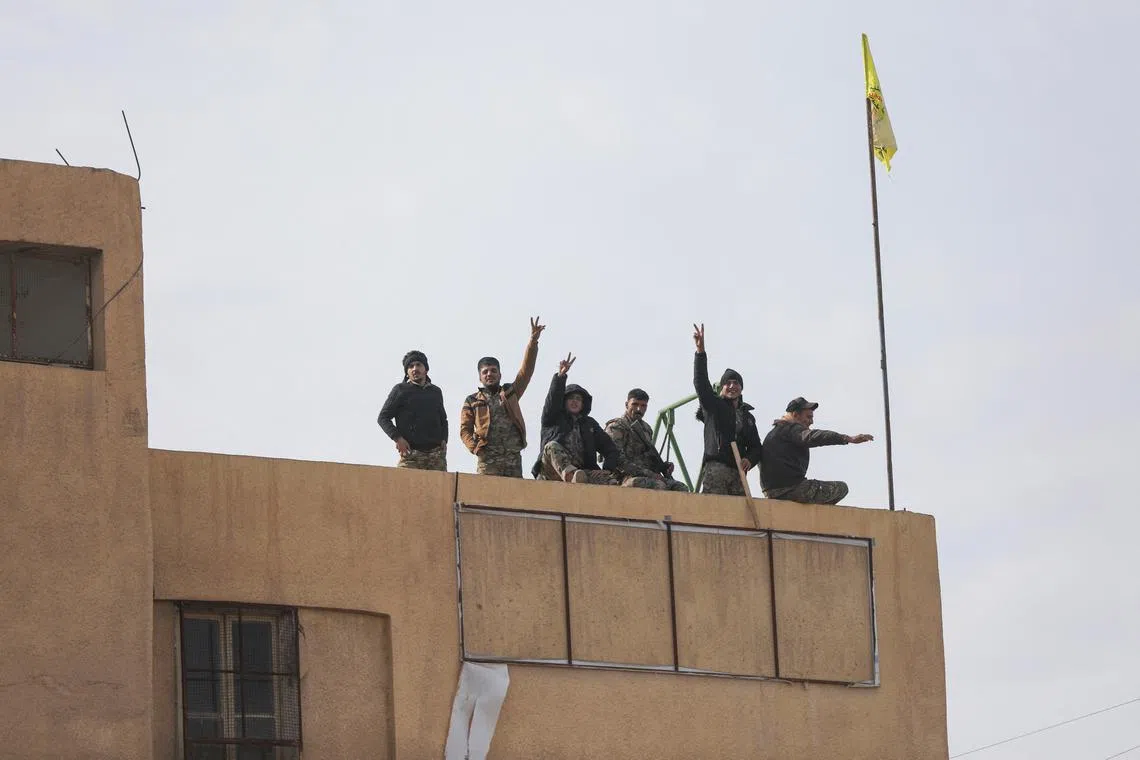
Members of the Kurdish-led Syrian Democratic Forces seen in Deir el-Zor after a US-backed alliance led by Syrian Kurdish fighters captured the city on Dec 7.
PHOTO: REUTERS
Mr Gargash blamed Mr Assad’s downfall on a failure of politics and said he had not used the “lifeline” offered to him before by various Arab countries, including the UAE.
Jordan affirmed on Dec 8 the importance of preserving the stability and security of Syria, the state news agency reported.
US President Joe Biden and his team were monitoring the “extraordinary events in Syria”
“Assad is gone. He has fled his country. His protector, Russia, Russia, Russia, led by Vladimir Putin, was not interested in protecting him any longer,” US President-elect Donald Trump posted on X.
“Russia and Iran are in a weakened state right now, one because of Ukraine and a bad economy, the other because of Israel and its fighting success.”
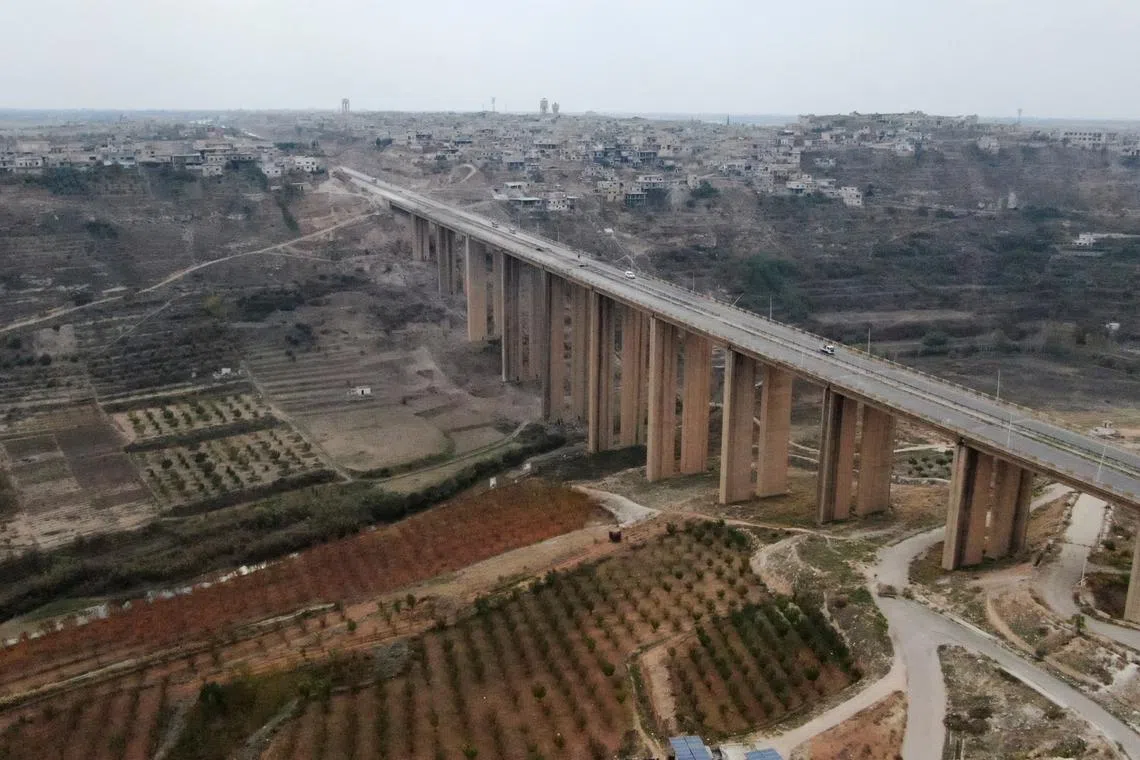
A drone view of Al-Rastan bridge in the Homs countryside after Syrian rebels pressed their lightning advance on Dec 7.
PHOTO: REUTERS
China’s Foreign Ministry said on Dec 8 that Beijing “is closely following the development of the situation in Syria and hopes that Syria returns to stability as soon as possible”.
Israel, which has severely weakened the Iran-backed groups Hezbollah in Lebanon and Hamas in Gaza, will most likely celebrate the fall of Mr Assad, another of Iran’s key regional allies. But the prospects of an Islamist group ruling Syria are likely to raise concerns.
Suspected Israeli strikes hit Mazzeh district of Damascus, one Lebanese and one Syrian security source said on Dec 8.
Jets believed to be Israeli bombed the Khalkhala air base in southern Syria that was evacuated by the Syrian army overnight, two regional security sources told Reuters.
The Israeli government had no immediate comment on the reported strikes, which one of the sources said appeared to be aimed at preventing weapons falling into the hands of radical Islamist groups. REUTERS
